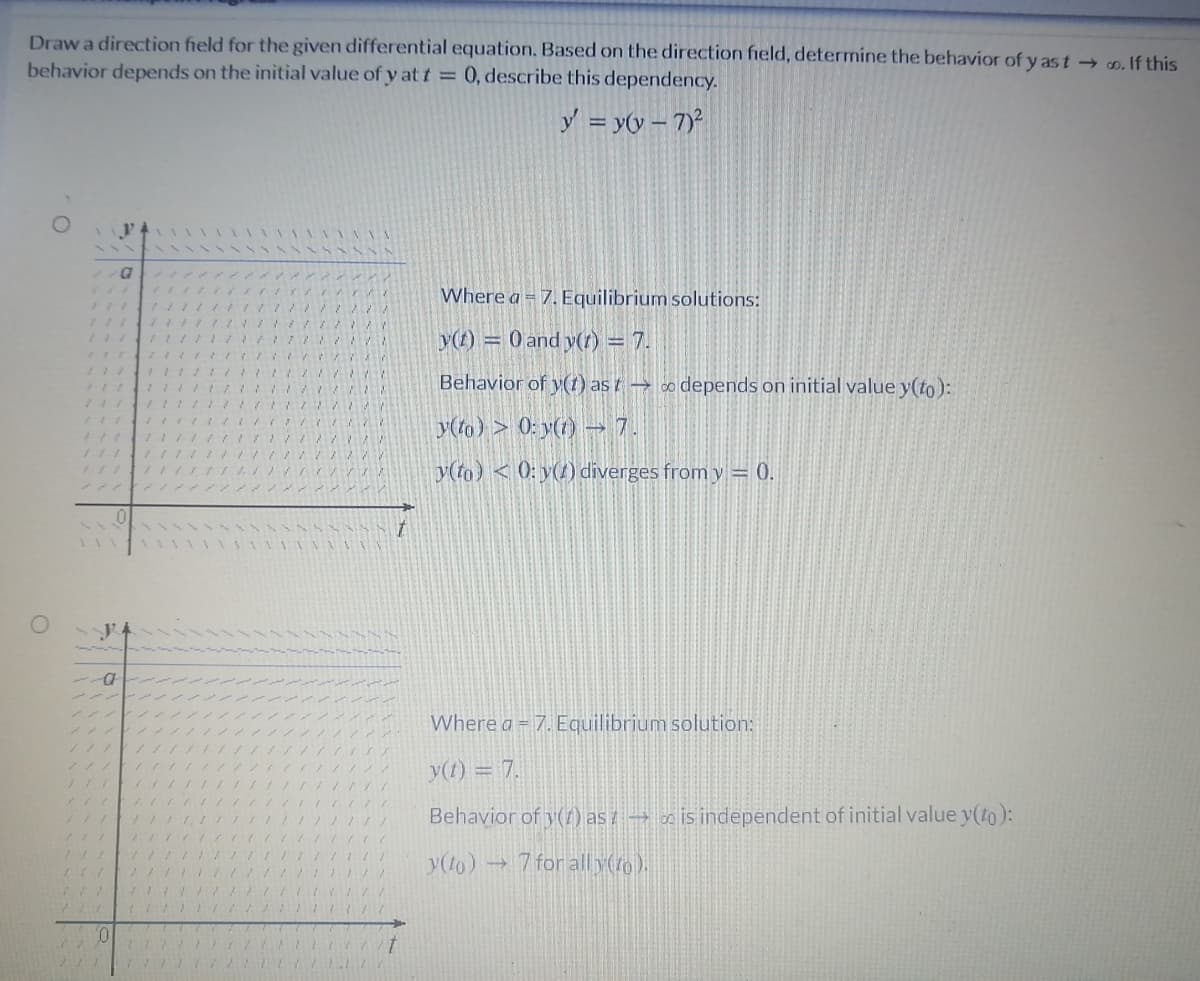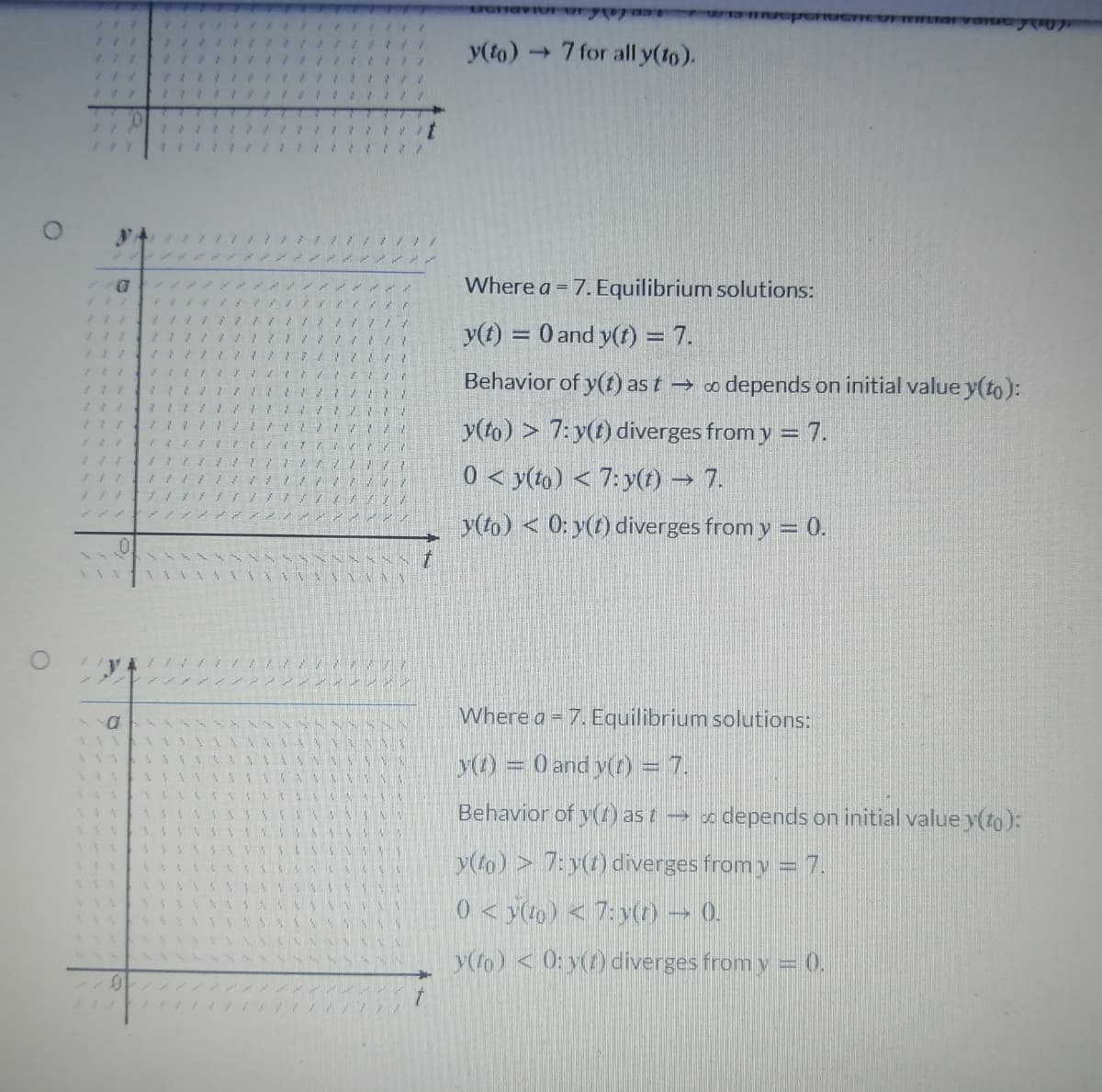Draw a direction field for the given differential equation. Based on the direction field, determine the behavior of y ast o. If this behavior depends on the initial value of y at t = 0, describe this dependency. y = y(y – 7 Where a = 7. Equilibrium solutions: 721 y(t) = 0 and y(t) = 7. Behavior of y(t) as t → ∞ depends on initial value y(to): y(to) > 0: y(1) → 7. y(to) < 0: y(4) diverges from y = 0. Where a = 7. Equilibrium solution: ンン y(t) = 7. Behavior of y() as is independent of initial value y(to): y(10) 7 for all y(fo).
Draw a direction field for the given differential equation. Based on the direction field, determine the behavior of y ast o. If this behavior depends on the initial value of y at t = 0, describe this dependency. y = y(y – 7 Where a = 7. Equilibrium solutions: 721 y(t) = 0 and y(t) = 7. Behavior of y(t) as t → ∞ depends on initial value y(to): y(to) > 0: y(1) → 7. y(to) < 0: y(4) diverges from y = 0. Where a = 7. Equilibrium solution: ンン y(t) = 7. Behavior of y() as is independent of initial value y(to): y(10) 7 for all y(fo).
Calculus: Early Transcendentals
8th Edition
ISBN:9781285741550
Author:James Stewart
Publisher:James Stewart
Chapter1: Functions And Models
Section: Chapter Questions
Problem 1RCC: (a) What is a function? What are its domain and range? (b) What is the graph of a function? (c) How...
Related questions
Question

Transcribed Image Text:Draw a direction field for the given differential equation. Based on the direction field, determine the behavior of y ast → o. If this
behavior depends on the initial value of y at t = 0, describe this dependency.
y = y(y – 7
Where a = 7. Equilibrium solutions:
y(1) = 0 and y(t) = 7.
Behavior of y(t) as t → ∞ depends on initial value y(to):
y(to) > 0: y(1) → 7.
y(to) < 0: y(1) diverges from v = 0.
Where a = 7. Equilibrium solution:
y(1) = 7.
Behavior of y() as is independent of initial value y(to):
y(to) 7 for all (ro ).

Transcribed Image Text:y(to)
- 7 for all y(to).
/? /// / /
Where a = 7. Equilibrium solutions:
y(t) = 0 and y(f) = 7.
%3D
I IER 7/ E
Behavior of y(t) as t
→ ∞ depends on initial value y(to):
y(to) > 7: y(t) diverges from y = 7.
0 < y(to) < 7: y(t) → 7.
y(to) < 0; y(1) diverges from y = 0.
Where a = 7. Equilibrium solutions:
y() = 0 and y(r) = 7.
Behavior of y(t) as t
→ o depends on initial value y(to ):
555
y(to) > 7: y(1) diverges from y = 7.
0<y(t0) < 7:y() → 0.
155
y(fo) < 0: y() diverges from y=0.
Expert Solution
This question has been solved!
Explore an expertly crafted, step-by-step solution for a thorough understanding of key concepts.
Step by step
Solved in 2 steps with 2 images

Recommended textbooks for you

Calculus: Early Transcendentals
Calculus
ISBN:
9781285741550
Author:
James Stewart
Publisher:
Cengage Learning

Thomas' Calculus (14th Edition)
Calculus
ISBN:
9780134438986
Author:
Joel R. Hass, Christopher E. Heil, Maurice D. Weir
Publisher:
PEARSON

Calculus: Early Transcendentals (3rd Edition)
Calculus
ISBN:
9780134763644
Author:
William L. Briggs, Lyle Cochran, Bernard Gillett, Eric Schulz
Publisher:
PEARSON

Calculus: Early Transcendentals
Calculus
ISBN:
9781285741550
Author:
James Stewart
Publisher:
Cengage Learning

Thomas' Calculus (14th Edition)
Calculus
ISBN:
9780134438986
Author:
Joel R. Hass, Christopher E. Heil, Maurice D. Weir
Publisher:
PEARSON

Calculus: Early Transcendentals (3rd Edition)
Calculus
ISBN:
9780134763644
Author:
William L. Briggs, Lyle Cochran, Bernard Gillett, Eric Schulz
Publisher:
PEARSON

Calculus: Early Transcendentals
Calculus
ISBN:
9781319050740
Author:
Jon Rogawski, Colin Adams, Robert Franzosa
Publisher:
W. H. Freeman


Calculus: Early Transcendental Functions
Calculus
ISBN:
9781337552516
Author:
Ron Larson, Bruce H. Edwards
Publisher:
Cengage Learning